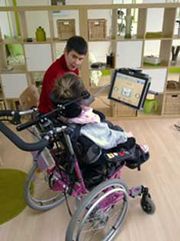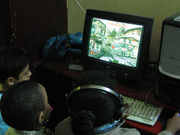Talk:DeAnza College/CIS2/Winter 2010/Group 1
- [View source↑]
- [History↑]
Contents
| Thread title | Replies | Last modified |
|---|---|---|
| Nadiya Jain. Statistics and trends on Internet and children | 0 | 16:59, 15 March 2010 |
| Introduction- Jason Raley | 0 | 16:54, 15 March 2010 |
| Project Outline | 0 | 16:53, 15 March 2010 |
| Pros and Cons- Khang Nguyen | 0 | 16:39, 15 March 2010 |
Nadiya Jain. Statistics and trends on Internet and children (1) HistoryMoveWatchOther than shutting down forever, how does one treat an Internet addiction? In China online addicts are put behind bars and given shock treatments to ensure they don’t abuse their access. In the German town of Boltenhagen there is actually a camp geared towards weaning kids from the Internet.
Research by Stanford University School of Medicine in 2008 shows video games do have addictive characteristics, and a Harris Interactive Poll released in April 2007 showed that 8.5% of youth gamers in the United States could be “classified as pathologically or clinically addicted to playing video games.”
Here some interesting statictics: The Washington Post • About 6% of surveyed individuals responded, “their relationships suffered as a result of excessive Internet use.” • About 9% attempted to conceal “nonessential Internet use.” • Nearly 4% reported feeling “preoccupied by the Internet when offline.” • About 8% said they used the Internet as a way to escape problems • Almost 14% reported they “found it hard to stay away from the Internet for several days at a time.” A 2006 telephone-based Stanford University Study revealed one in eight individuals displayed at least one “problematic” sign of excessive Internet use. Elias Aboujaoude, a clinical Assistant Psycholology and Behavioral Sciences Professor at Stanford’s Impulse Control Disorders Clinic likens these problematic behaviors such as the constant need to check email or visit online forums and chat rooms as being similar to the cravings drug addicts experience. Some statistics from the Stanford University study: • 13.7 percent of those interviewed found it hard to stay away from the Internet for several days at a time • 12.4 percent stayed online longer than intended very often or often • 12.3 percent had seen a need to cut back on Internet use at some point • 8.7 percent attempted to conceal non-essential Internet use from family, friends and employers • 8.2 percent used the Internet as a way to escape problems or relieve negative mood • 5.9 percent felt their relationships suffered as a result of excessive Internet use
Here are some additional research highlights:
-In online chat rooms, youths were less likely to curse or engage in sexual talk if the chat room had a monitor. (WebMD)
-Zheng Yan, EdD suggests using highly restricted filtering programs and kid-oriented sites for very young kids, with less restrictive filters for older children. (WebMD)
-When teens visit moderated chat rooms, they're less likely to swear and engage in racy talk than if they visit chat rooms without moderators. (WebMD)
-A Study by Harris Interactive reports that 1 in 10 kids between the age of 8 and 18 years old are addicted to online gaming.(Symantec)
Since 1984, the percentage of children with home access to computers has steadily increased from 15 percent to 76 percent in 2003. In addition, the percentage of children who use the internet at home rose from 22 percent in 1997, and up to 42 percent in 2003.
It seems that the research done clearly shows that spending a lot of time on the internet can have both negative and positive effects on young people. Benefits of computer use have been observed, they typically depend on a variety of factors and the most influential is defiantly the subject matter involved. There are many ways in which the internet can be a helpful tool and uses of the Internet have shown an improvement in academic achievement among low-income youth and a way to provide health information to youth living in developing countries. Internet forums and chat rooms provide a powerful vehicle for bringing together adolescents with the same interests. Online interactions provide essential social support for otherwise isolated adolescents, but these online forums may also encourage self-injurious behavior and add lethal behaviors to the already established adolescent self-injurers. The proper use of the internet can produce extraordinary results and also extremely negative effects when utilized in a certain environment. The Web is primarily text. Thus, more time on the Web means more time spent reading, which may explain the increase in reading test scores that most students have experienced from extended internet use. The internet can and will be used more and more in the future of education and learning there are methods currently being developed to increase other skills besides reading that might not have been previously been explored. One of the main key points to the internet is it can also be a good educational tool for hard-to-reach populations of children in struggling countries.
Introduction: This project will hopefully highlight the positive aspects of children using the Internet as well as providing some safeguards by identifying the vulnerabilities. It will also provide what steps can be taken to minimize the negative aspects. In addition, it will provide WikiEducator suggestions to promote their site.
Objectives: List pros and cons of Internet usage by children. Show statistics and trends on Internet and children. Suggest changes to improve the use of Internet for children. Recommendations to WikiEducator to help promote and recruit.
Research: We’ll need to research pros and cons regarding children and the Internet. Maybe even brainstorm what we already know. We’ll need to find statistics and trends on Internet usage by children. Another brainstorm/research for improvements as well as the recommendations to WikiEducator.
1) What are some pros and cons to the use of the Internet by children?[edit]
Pros:
-Low-income kids got better grades and test scores in reading after being given home Internet access. (WebMD)
-Linda Jackson, PhD studies show that kids that spent more time at home on the internet had higher grade-point averages and reading test scores. (WebMD)
-The internet provides a wide selection of resources such as http://www.our-kids.org/okothersites.html that will direct children to safe sites that support their needs.
-Children with disabilities can find special education and early intervention programs at sites like http://www.familyvillage.wisc.edu/school.htm
-Government regulations like Children’s Online Privacy Protection Act (COPPA) require websites to explain their privacy policies to make internet safer for children.
-There are softwares that keep networking sites like Facebook safer are being implemented to keep kids from trouble. (WSJ)
Cons:
-Message boards about self-harm create bad influence for children. (WebMD)
-Search engines might lead children to pornographic material. (WebMD)
-Using the internet might unintentionally lead to pornographic addiction. (CBN)
-Playing online games could become a bad addiction. (Symantec)
-The following addiction traits and behaviors based on The Canyon: Renowned Rehab and Substance Abuse Treatment Center (thecyn) could happen:
* Spending hours online without a break. * Preferring to spend time with a computer over friends and family. * Lying about the amount of time spent online. * Hiding what you do online. * Checking email several times an hour. * Family complains about the amount of time spent online. * Thoughts are always on the Internet – even when offline. * Logging on while at work or school instead of working or studying. * The first thing an addict does when family leaves the house is log on.
What we can do:
-Have moderators, online tools for parental control, get involve with children, and talk to kids about internet use. More information and tips can be found at KidsHealth and PCWorld’s articles.

